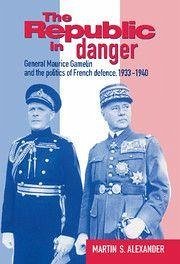The first full-length study in English of 'the man who lost the Battle of France'.
This is the first full-length study in English of the career of one of France's most controversial military leaders, General Maurice Gamelin (1872-1958). Gamelin was reviled by many of his contemporaries and denigrated by historians as 'the man who lost the Battle of France'. Here Gamelin is re-appraised in the context of the unstable civil-military relations and national decline of the years 1933-40. Basing his account on hitherto inaccessible primary sources and on public and private archives. The evidence reviewed, including Gamelin's private headquarters' diary, provides the basis for a revision of the earlier hostile portraits of the general. The author argues that less attention should be paid to the campaign in France in 1940, by which time Gamelin's role was that of co-ordinator and adviser. Rather, he suggests that great credit is due to Gamelin for his success in holding together the pre-war civil-military consensus, and for re-arming France by 1939.
Table of content:
Acknowledgements; Introduction; 1. The making of a republican general; 2. Gamelin and the rebirth of German power; 3. First responses: defence versus détente in the Laval era; 4. The Popular Front, the army and politics; 5. The road to rearmament: Gamelin, Daladier and Popular Front defence policy; 6. Gamelin and air support of the army; 7. Gamelin, the Maginot Line and Belgium; 8. Gamelin, Yugoslavia and the eastern alliances: assets or embarrassments?; 9. Men or material? Gamelin and British support for France; 10. Czechoslovakia, Poland, and Soviet Union: from appeasement to war; 11. Gamelin and the fall of Poland; 12. The Twilight War: military stagnation and political conflict; Conclusion; Appendices; Notes; Bibliography; Index.
Hinweis: Dieser Artikel kann nur an eine deutsche Lieferadresse ausgeliefert werden.
This is the first full-length study in English of the career of one of France's most controversial military leaders, General Maurice Gamelin (1872-1958). Gamelin was reviled by many of his contemporaries and denigrated by historians as 'the man who lost the Battle of France'. Here Gamelin is re-appraised in the context of the unstable civil-military relations and national decline of the years 1933-40. Basing his account on hitherto inaccessible primary sources and on public and private archives. The evidence reviewed, including Gamelin's private headquarters' diary, provides the basis for a revision of the earlier hostile portraits of the general. The author argues that less attention should be paid to the campaign in France in 1940, by which time Gamelin's role was that of co-ordinator and adviser. Rather, he suggests that great credit is due to Gamelin for his success in holding together the pre-war civil-military consensus, and for re-arming France by 1939.
Table of content:
Acknowledgements; Introduction; 1. The making of a republican general; 2. Gamelin and the rebirth of German power; 3. First responses: defence versus détente in the Laval era; 4. The Popular Front, the army and politics; 5. The road to rearmament: Gamelin, Daladier and Popular Front defence policy; 6. Gamelin and air support of the army; 7. Gamelin, the Maginot Line and Belgium; 8. Gamelin, Yugoslavia and the eastern alliances: assets or embarrassments?; 9. Men or material? Gamelin and British support for France; 10. Czechoslovakia, Poland, and Soviet Union: from appeasement to war; 11. Gamelin and the fall of Poland; 12. The Twilight War: military stagnation and political conflict; Conclusion; Appendices; Notes; Bibliography; Index.
Hinweis: Dieser Artikel kann nur an eine deutsche Lieferadresse ausgeliefert werden.








